PhD Students Supported by W-SPRING Attend “Future Doctor Festival 2024”
Wed, Aug 7, 2024-
Tags
A place for new exchanges between researchers and society
The “Future Doctor Festival 2024” took place on July 10th at Hitotsubashi University and was hosted by the Ministry of Education, Culture, Sports, Science and Technology-Japan (MEXT) and co-hosted by the Japan Science and Technology Agency (JST). Following last year, this is the second time the event was held. It featured presentations, research exhibits, and panel discussions to communicate the strengths of doctoral personnel to industries, government agencies, and other organizations.
A wide range of participants, including faculty members, doctoral students, companies seeking doctoral personnel, as well as ministry and agency officials and corporate executives with doctoral degrees attended the event. There was a lively exchange of opinions on topics such as implementing research results to solve social problems, collaborative research, and business creation, resulting in productive discussions.
This article will showcase the day’s events while focusing on the three student attendees from Waseda University who receive support from the W-SPRING Program.
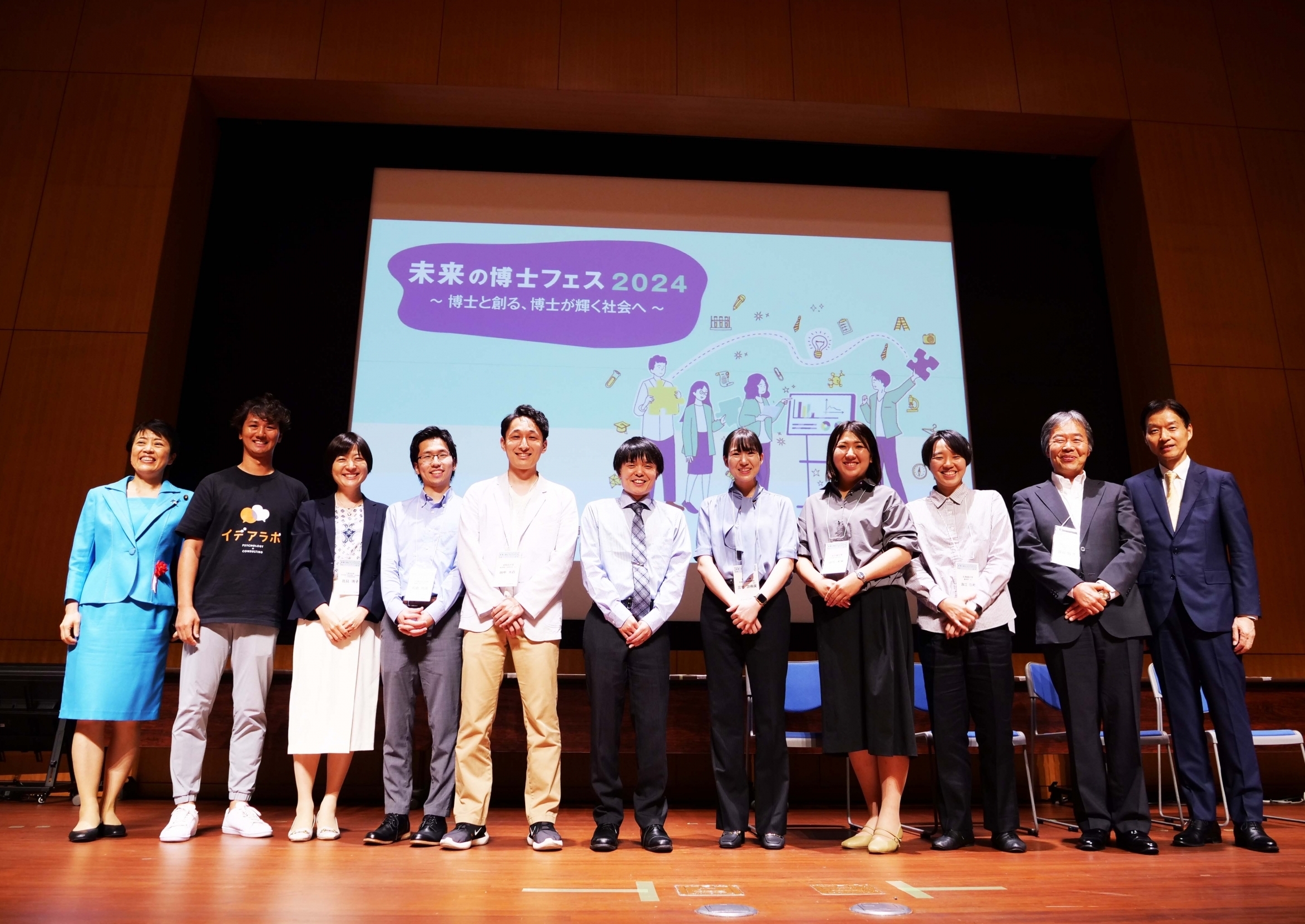
A Doctoral Student that Balances Research with Running a Business Presents “The Future of Architecture”
Scientific and technological innovation is creating new value through innovative technologies and ideas and doctoral candidates are attracting attention as the key players in this field. Against this backdrop, MEXT sponsors the “Future Doctor Festival”.
A second-year in the Graduate School of Creative Science and Engineering, Hiroki Tanaka, took the podium to give “A Short Presentation from a Doctoral Student.” While attending graduate school, he also acts as the CEO of Urth, a company he founded during his third-year as an undergraduate with support from a business creation program at Waseda.
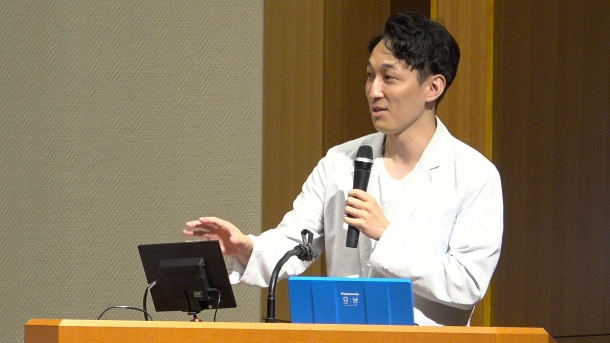
Tanaka, the CEO of Urth, during his presentation. Urth is a company with a unique business model that provides a metaverse to corporations by utilizing architects.
Tanaka presented his research on “Mathematical Formulas for Building Standards.” While AI and 3D printers are changing conventional design and construction methods, he is researching a system that can automatically optimize design by incorporating building codes into the system by converting them into mathematical formulas. If realized, this could significantly improve the efficiency of architects. Tanaka emphasized that he is striving to “export technology to countries with emerging markets” in the future.
Tanaka’s goal is to create a society where everyone can thrive. He believes that if we can change our spaces more easily, those spaces will become a means of expression, which will allow us to freely create useful spaces. To that end, he wants to create the infrastructure that allows anyone to create a space to their liking.
While fielding questions, Tanaka shared his ideas for the future after he was asked about the use of 3D printers to construct in outer space. Another comment from an audience member illustrated the positive reception of Tanaka’s presentation. The commentor shared that they hoped Tanaka would pass along the mindset of doing business as a doctoral student to others.
The Poster Session: Active Exchanges Across Disciplines
At the poster session, t student in the Graduate School of Law, Sato Naito, along with Tanaka, displayed posters. During the poster session they were able to interact with other researchers as well as company representatives.
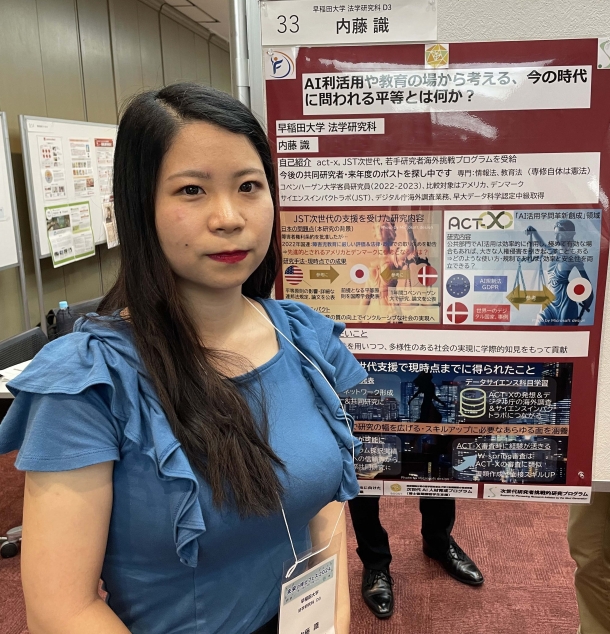
Naito at the poster session. She is researching issues in education for people with disabilities in Japan by comparing the same in the US and Denmark.
Naito is working towards an inclusive society, by taking the approach of improving laws and the quality of education for people with disabilities. She exchanged ideas with people from other fields of study at the poster session and received feedback that helped broaden her prospective. While receiving support from JST’s Young Researchers Program, she will continue her research, and is searching for joint research opportunities or employment for next year. At this event she received advice on collaborative research. She also had the opportunity to learn about the careers of doctoral graduates, and overall felt that the time she spent at the event was very meaningful.
Tanaka shared that exchanging knowledge that can change society across fields of study is important, and the opportunity to meet researchers from the same generation at the poster session was extremely valuable. Through this event, he realized that there are many people who support doctoral students, and he says he will try his best to take on the challenge and live up to their expectations.
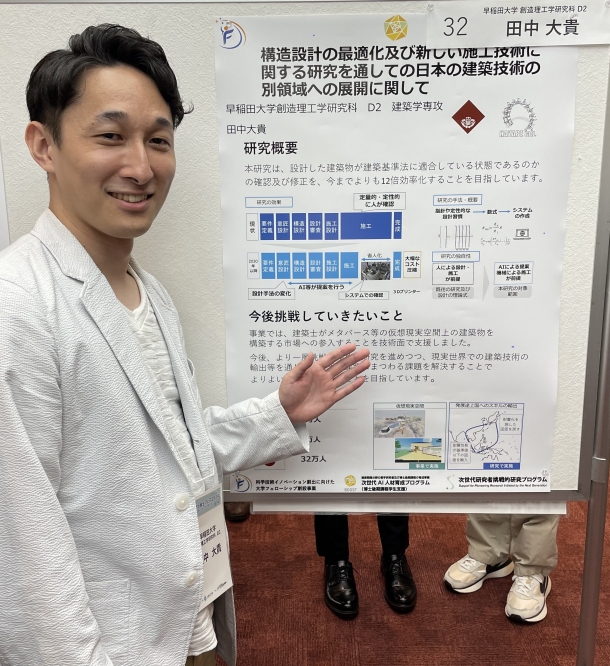
Tanaka gesturing towards his research poster
Young Researchers Capable of Ideas that Make New Forms of Diversity Possible
The second half of the event featured the “Grand Prix for Proposals Solving Social Issues” in which mixed university teams presented their solutions to social issues given by companies. The Rakuten Group’s challenge was “Accelerating and promoting sustainability in society – Designing new apps and services to promote sustainable action!” Peralta Sien Reeve Ordonez, a first-year doctoral student in the Graduate School of Fundamental Science and Engineering, participated in the proposal.
The theme of the project was “A Society that Leaves No One Behind.” Ordonez’s team proposed a service for people who are allergic and/or sensitive to chemicals to tag products and services offered on Rakuten’s platforms as “fragrance-free” and include reviews of the chemicals used in them. A representative from Rakuten commented, “I felt this was feasible because it can be tied to the various platforms Rakuten offers and the review feature could be very useful.” The team was awarded the Rakuten Prize at the closing ceremony.
The “Future Doctor Festival 2024” created the opportunity for future-oriented communication between doctoral students, companies, and government agencies. The seeds of co-creation that were planted that day will grow into action that advances society.
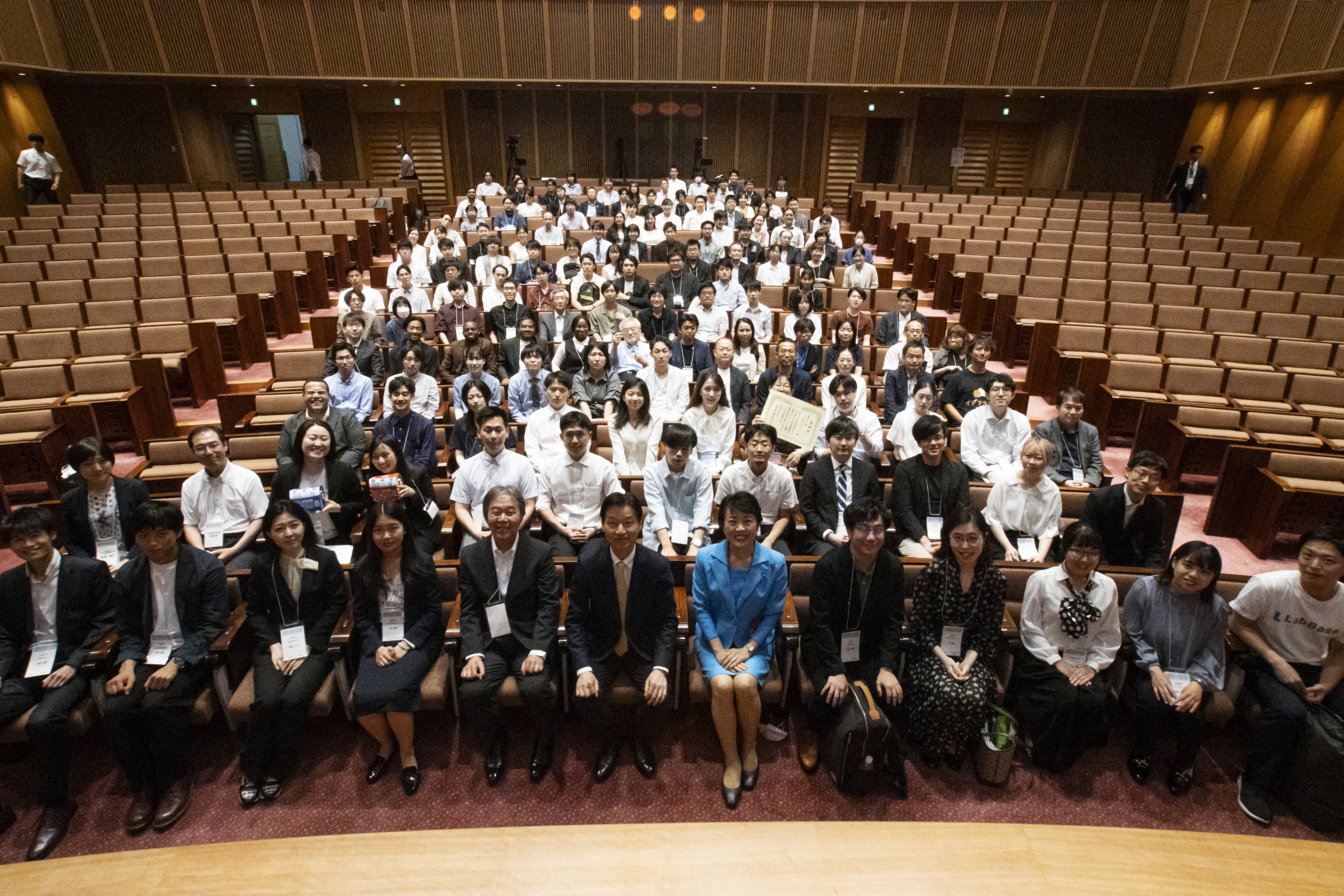
A group photo taken after the closing ceremony














